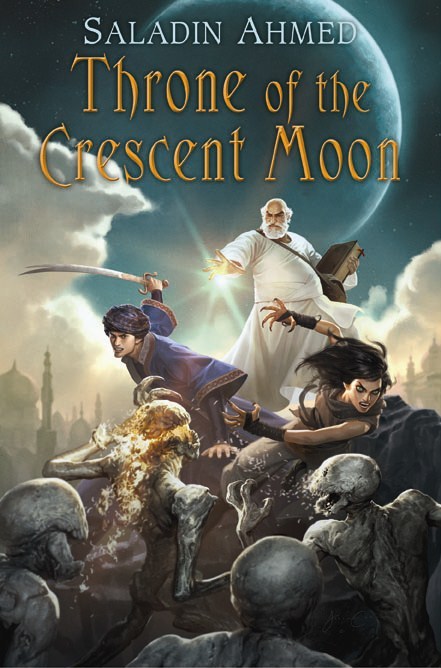- Reviews
- _Book reviews
- _Film and TV Reviews
- _Game Reviews
- _Thursday Morning Superhero
- _Short Fiction Reviews
- Lists
- _New Books Spotlight
- _6 Books Posts
- _We Rank 'Ems
- Features
- _Interviews and Blogtables
- _Talking About Books
- _The Hugo Awards
- _Mini-Projects
- Projects
- _Nerds on Tour (2020)
- _The Hugo Initiative (2019)
- _Feminist Futures (2018)
- _Dystopian Visions (2017)
- Meet the Flock
- Review Policy
- Home
Monday, April 23, 2012
Micro Review [book]: Throne of the Crescent Moon by Saladin Ahmed
The Meat
Fantasy fiction is a pretty conservative genre: you've got swords, you've got magic, some combination of dragons, elves, monsters and gods and a healthy dose of Celtic, Nordic and/or High Medieval mythology. It all takes place in alt-England, alt-Ireland, alt-Scotland or alt-France--maybe if you're really lucky, you get a bit of alt-Germany or alt-Scandinavia thrown in for good measure. There are probably knights, and some code of chivalry; there are definitely kings and queens, and a high probability that at least one of them serves a dark lord. Somewhere to the east or south of where the action takes place, you get some foreign types who dress funny, have shocking attitudes towards sexuality and generally behave in an appropriately exotic and exoticized manner.
Enter Saladin Ahmed, who thinks this is a bit of a problem. His solution? Write a fantasy book that isn't just trapped in proverbial Europe, but draws upon other mythological sources--specifically, on the rich tradition of magic and high adventure found in the medieval Islamic world.
Throne of the Crescent Moon follows Doctor Adoulla Makhslood, "the last real ghul hunter in the great city of Dhamsawaat." He and his steady companion, dervish and swordmaster Raseed, uncover a sinister plot that threatens the realm, and enlist the help of the sorcerer Dawood, his wife (and accomplished alkemist) Litaz and a shape-shifting nomad, Litaz. I won't say more, because unlike most other reviewers, I don't want to spoil your fun.
So how well does it all work? To begin, Ahmed has crafted a fantasy world that feels fresh, new and familiar all at the same time. In part, that's because, thanks to various popularizations of the 1001 Nights/Arabian Nights, people are more familiar with the underlying mythos than they might realize (djen = genie; ghul = ghoul; etc.). More tangibly, though, it's because of Ahmed's fluency with this mythos and his wise decisions to: a) allow himself some flexibility with it as source material; and b) drop readers in the middle of the story, and let them internalize the world as they go along. The dense cities, political structures, social relations, metaphysics and climate, as a result, all feel natural and well-realized. As much as I love A Song of Ice and Fire and other alt-Europe-based fantasies, I can't stress enough how important it is for the genre to break free from its mythological cliches and geographic trappings.
It isn't a perfect book, though. For all the inventiveness in world-building, the plot (heroes save kingdom from evil menace) is a little too familiar. The main characters also leave something to be desired. Adoulla is clearly supposed to be the "cantakerous-but-lovable sage," but he often comes off as just cranky and mean; consequently it isn't clear why his foil, Raseed (aka the "pious prude"), sticks around with him. Nor why the godly Raseed falls in love with the enigmatic and decidedly impious shape-shifter, Zamia. Fellow companions Daoud and Litaz are more fully realized, but I wanted to know more about them too.
...and that's the main problem: Throne of the Crescent Moon is too short. Not that every fantasy book needs to be 900+ pages, but as is, we don't get enough insight into what motivates these characters, their backgrounds or enough complexity in their relationships with one another. This lends them a sort of YA fiction sensibility. This won't be a problem for everyone--plenty of adults love Harry Potter and Hunger Games--and consequently it shouldn't be a surprise to see a book straddle the line between YA and adult fiction. But my feeling is that, given the often mature and challenging subject matter, it neither intentional nor the optimal path. It's also something that could be solved with an extra 100 or so pages of character development. Here's hoping the next installment gets a little more meat on its bones.
Bottom line is, Throne of the Crescent Moon may not be the best the genre has to offer, but it's still a fun, engaging read that breaks barriers, introduces you to a memorable world and leaves you looking forward to the sequel. It reminds me a bit of old-school adventure tales, like ones written by Edgar Rice Burroughs or Robert E. Howard--only without the anachronisms and embarrassing colonial-era sensibilities. If that sounds like your cup of tea, you're in for a treat.
The Math
Quality of Writing: 7/10
Bonuses: +1 for deviating from crusty genre norms; +1 for picking a rich alternative in terms of historical and mythological source material, and applying it successfully; +1 for this book actually feels "fun," and that makes you realize how few adventure stories are actually "fun" anymore
Penalties: -1 for all that said, the plot feels a little too familiar; -1 for YA-style characters; -1 for these issues could have been solved with a bit more explication
Nerd Value Coefficient: 7/10, "an enjoyable experience, but not without its flaws"
[See explanation of our non-inflated scores here.]
Labels:
books,
fantasy,
microreview
